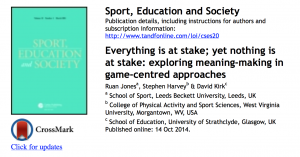Comparing Coach and Player Centred Coaching…
As I have already said over the last couple of weeks, if coaches/teachers/parents are more aware of the differences between these two approaches/philosophies then they can be more informed and thus make better decisions about how they wish to teach/coach and from a parents perspective, have a better understanding of what they should be observing stood on the sidelines whilst watching their child/children play sport with a coach/teacher.
One of these ways is to find some of the research out there and then translate it into coaches’/teachers’/parents’ speak that is concise and easier to understand. Quite often research articles are stuck behind paywalls and thus hard to get. They are also written in language that is sometimes difficult to cypher, are rather long and take a good chunk of time to get through and understand.
“This molecular view, reflecting the hegemony of biomechanics, helps teachers break down games content into the smallest component parts of technique before introduction to the game; tactical and perceptual aspects of skills are added methodically to the technique (Kirk, 2010). This process might result in movement patterns becoming increasingly abstract and as far removed from the game to render them meaningless.” (p.2)
This is where the power of Vern Gambetta’s GAIN Professional Network comes to great fruition, as my very good friend Xavier Roy (a GAIN member out in Montreal, Canada), is busy finishing his PhD at University of Sherbrook which means he basically has open access to all the Journals out there. So I send Xavier a message and when he can, he’ll email back the particular article(s) that I am interested in reading.
A comparison between ‘Game-Centred Approach’ (GCA) and the ‘Technical Model’ (TM)
“Werner, Thorpe, and Bunker (1996) propose that the traditional and enduring games teaching model, referred to as the technical model (TM), typically follows a series of highly structured lessons relying heavily on the teaching of skills and techniques. It is concerned primarily with the development of control and combination experiences through refining and mastering tasks. They further state that once skills are mastered or refined, it is assumed that these skills can be successfully transferred into game situations. The GCA stands as the complete antithesis of the TM since it starts with a game form (Thorpe, Bunker, & Almond, 1986), and this contextualizes the motor, cognitive or social-affective outcomes of the lesson.” (p.2)
Here’s my summary of Ruan Jones, Stephan Harvey & David Kirk (2014): Everything is at stake, yet nothing is at stake: exploring meaning in game-centred approaches…
| Factor | Game-Centred Approach (GCA) | Technical Model (TM) |
| Heart of Teaching | Learner, Game | Coach/Teacher |
| Games | Build Up | Break Down |
| Engagement | Yes | No |
| Structure | Framework | Highly Structured |
| Teaching | Games | Skills & Techniques |
| Transfer of Skills to a Match | Actually happens | Assumed |
| Mastery | Game | Skills |
| Starting with… | a Game | a Talk |
| Learning | Active, Social & Interpretive act | Passive, Performer isolated from their environment |
| Performer/Learner | In communication with the environment | No communication with the environment |
| Choice | Greater choice & responsibility to solving problems | NO choice & NO responsibility |
| Components | All together | Broken-up |
| Focus of Anlysis | Active thinking agents as they interact with other & environmental sub-system | Individual behaviour & thought |
| Motivation | Intrinsic | Extrinsic |
| Environment | Autonomy/Freedom | Dependence on the coach |
| Decision Making | Yes | No |
| Game Form | ‘Master of the player’, Provide illusion of reality to the learner | No fantasy, No reality |
| Book | Fiction/Fantasy | Non-Fiction/Factual |
I will let you come to your own conclusion, but one can basically say that a GCA is Player-centred Coaching and TM is Coach-centred Coaching.
Feel free to get in touch with me with questions you’d like answering or a particular topic you’d like to know more about…
I plan to write a weekly article every Sunday evening…
If I don’t receive any recommendations during each week then I’ll pick a topic or an experience to write about to share with you that I hope will help you on your Coaching Journey as one person teachers, two people learn…




One thought on “WHY Player-centred Coaching… ii”